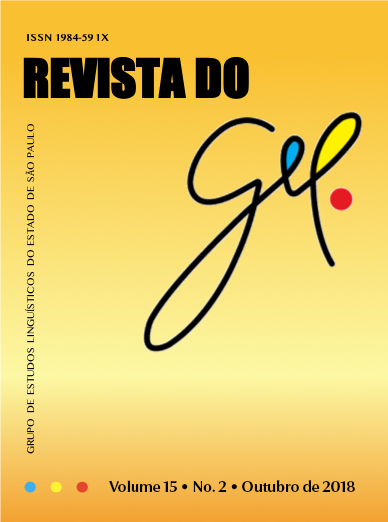Cognitive Phonology
DOI:
https://doi.org/10.21165/gel.v15i2.2053Keywords:
Cognitive Phonology. Symbolic Structures. Sound. Meaning.Abstract
Cognitive Phonology is a branch of Cognitive Grammar which has its origins from Langacker’s (1987, 2007, 2008), Lakoff’s (1987, 1993) and Taylor’s (2002) works. This theory adopts a non-modular paradigm of the mind and is based on the premise that the cognitive skills required for language are similar to those ones used in other cognitive tasks (COUPER, 2011). Since Cognitive Phonology is part of Cognitive Grammar, there is a correlation between phonology and other levels of structure (syntax, semantics, morphology, etc.), so sound cannot be learnt independently of meaning. Since Cognitive Phonology is an area explored in several countries, except in Brazil, this article aims to describe and discuss a topic which is still little explored by the academic environment in Brazilian territory, since most of the researches developed in that country are based on the theoretical and methodological assumptions of Phonology of Use, by Bybee (1994, 2001), which is another branch of Cognitive Linguistics.Downloads
Download data is not yet available.
Downloads
Published
2018-11-13
How to Cite
Rosa, E. da. (2018). Cognitive Phonology. Revista Do GEL, 15(2), 85–97. https://doi.org/10.21165/gel.v15i2.2053
Issue
Section
Artigos
License
Esta revista oferece acesso livre imediato ao seu conteúdo, seguindo o princípio de que disponibilizar gratuitamente o conhecimento científico ao público proporciona maior democratização mundial do conhecimento.
A REVISTA DO GEL não cobra taxa de submissão ou de editoração de artigos (articles processing charges – APC).
Os critérios gerais de direitos autorais da REVISTA DO GEL estão dispostos no termo de direitos autorais que cada autor aceita ao submeter seu trabalho no periódico. Como regra geral o periódico utiliza as regras CC BY-NC da Creative Commons (regra disponível em: https://creativecommons.org/licenses/by-nc/4.0/legalcode)



